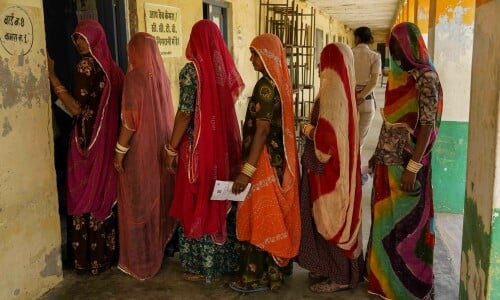In the largest election in history, India’s voting began on Friday. Prime Minister Narendra Modi is running for a historic third term in office on the platform of growth, welfare, his own popularity, and Hindu nationalism.
In the election, a coalition of twenty opposition parties will face off against Prime Minister Narendra Modi’s Bharatiya Janata Party (BJP), promising to enhance affirmative action, increase giveaways, and defend democratic institutions from his authoritarian control.
In the height of summer, the massive voting exercise involving over a billion voters will take place in seven phases throughout the nation with the largest population in the world. Votes will be tallied on June 4 after it closes on June 1.
In the biggest of the seven phases, which takes place on Friday, 166 million voters in 102 constituencies spread over 21 states and territories, including the most populous Uttar Pradesh in the north, Arunachal Pradesh on the Himalayan border with China, and Tamil Nadu in the south, will cast ballots.
In the midst of heavy security, voters started to queue outside polling places well in advance of its 7:00 am (0130 GMT) opening. Among them were elderly voters who required assistance getting to the polls.
The 32-year-old Muslim voter Abdul Sattar predicts that Modi will win again because, aside from his religious crusade, his other work—which includes safety and security—is good. Kairana, Uttar Pradesh, is around 100 kilometers from Delhi.
Father of eight Mohammed Shabbir, a sixty-year-old driver, claimed that since none of his kids work a regular job, unemployment is his biggest problem.
Because even Hindus are impacted by a shortage of jobs, he continued, Hindu nationalism is not a factor in this election.
In the world’s fastest-growing major economy, surveys indicate that the Bharatiya Janata Party (BJP) will easily gain a majority, despite voters’ grave concerns about unemployment, inflation, and rural suffering. The question now is whether and by how much the BJP can build on its triumph in 2019.
As per Modi’s election manifesto, the BJP promised to “take a number of pro-people decisions and actions, unveil the next generation of reforms, open up newer avenues of growth, launch a final and decisive assault against poverty, and take our nation into the top three economies of the world in the next five years.”
The BJP’s campaign program and slogan, “Modi Ki Guarantee,” or Modi’s commitment to keep his word to voters, highlight the party’s unique leader-centric, presidential-style platform within a parliamentary system.
Shortly before polls opened, Modi wrote on X, “I urge all those voting […] to exercise their franchise in record numbers.”
“I especially urge young people who are voting for the first time to cast a lot of ballots. Every voice matters and every vote matters, after all,” he remarked.
Opposition weakened and dispersed
After Jawaharlal Nehru, the leader of India after independence, Modi would be the only prime minister to be elected three times in a succession.
According to Modi, the main meal will be served in the third term; the first two were appetizers. In an effort to win over voters, BJP billboards may be seen all across towns and cities highlighting a variety of accomplishments throughout his two mandates, such as India’s historic landing on the moon’s south pole and combating corruption.
Indian nationalism is a major motif. Critics accuse the Modi administration and the BJP of discriminating against or singled out India’s 200 million Muslim minority in order to appease their extreme Hindu supporters, a claim that both parties refute. There is still sporadic bloodshed between Muslims and Hindus.
The election, according to the opposition INDIA coalition, is an ideological struggle to prevent the BJP from overthrowing the democratic and constitutional order.
The head of the main opposition Congress party, Rahul Gandhi, claimed that the BJP always tries to deflect attention away from important problems like inflation and unemployment.
Gandhi made reference to Modi’s well-publicized appearances in recent months when he added, “Sometimes the PM goes underwater in the ocean and sometimes he is on a seaplane but does not talk about issues.”
In addition to accusing the government of denying the partnership a fair chance at winning the election by arresting opposition leaders in cases of corruption and making exorbitant tax demands prior to it, the alliance has found it difficult to maintain unity and field candidates who share the same views as the BJP. The government disputes these allegations.
The BJP has a distinct advantage, but it also faces genuine obstacles, according to Chandrachur Singh, a political science professor at Delhi’s Hindu College.
“There are issues in this election,” he declared. “There are certain problems that might have caused anti-incumbency. However, a dispersed, feeble opposition is not channeling or harnessing that, the speaker stated.
“That is the reason voters are becoming disillusioned and enabling the BJP to gain ground.”








